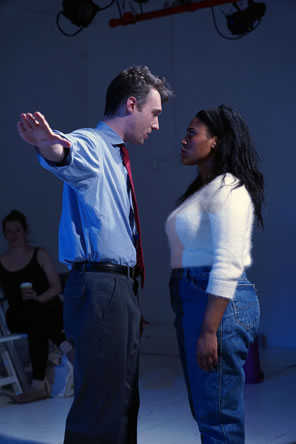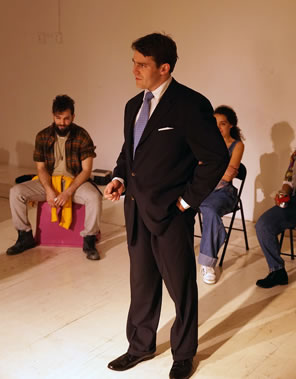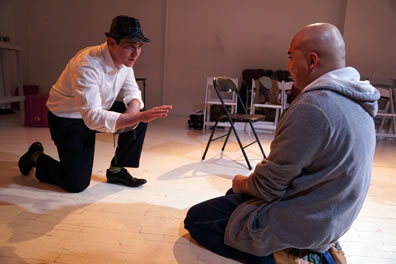Measure for Measure
Alternate Truths
The Night Shift, Alchemical Theatre Laboratory, New York, New York
Thursday, March 23, 2017, Front, center to side of 52-seat studio theater
Directed by Jonathan Minton

Angelo (Tom Harney) threatens Isabella (Yhá Mourhia Wright) in The Night Shift's production of William Shakespeare's Measure for Measure at the Alchemical Theatre Laboratory. Photo by Tyler Milliron, The Night Shift.
That my son is making his New York directorial debut with this presentation of William Shakespeare's Measure for Measure does not factor into my evaluation of the production. What does matter is that I have been privy to his thinking on this play from the moment he broached it with me even before he moved from Anchorage, Alaska, to New York five years ago. Some of that thinking I spurred (not a lot—he's far smarter and a much more astute Shakespearean than I am).
With this background, not only did I highly anticipate seeing this production, Shakespeareances.com stepped in as a sponsor to make sure the production would get the opportunity I felt it deserved (would I have done so if the director were not my son? No: but, then, no other director loops me into his or her creative process over several years as my son has). Thus, it is not in my role as father but as a reviewer more enlightened on this production than usual that I offer my evaluation of what turned out to be one of the most profoundly relevant renditions of Measure for Measure I've seen.
Example: At the opening night party, Jonathan told me that one of his directing notes to Colin B. Gold playing the Duke was to see him as a Richard III who doesn't get caught (and without the crookback, I would add). That for me was the most jarring interpretation of this Measure. In 11 previous productions of the play that I've seen, portrayals of the Duke range from hero to antihero to despot. My favorite portrayals have been the middle-ground reading of a ruler not entirely fit to rule who, through his disguise as a friar mingling with the people and learning of the corruption in his government, matures both politically and personally.
In Gold's portrayal, this Duke is blatantly Machiavellian. Though clearly loved by the people—Escalus (Margaret Catov) admires the Duke to the point of doting, and Lucio (Brian Nemiroff) is a misty-eyed nostalgic wishing for the Duke's return—this Duke is a manipulative puppet master of both the political and social realm of his government (I should have seen it coming: my son has been studying Benito Mussolini and Lyndon Johnson for insights). Minton extends this metaphor beyond the play proper. At the start, the cast, in the modern clothes they will wear for the play (costume design by Roejendra Adams), enter the play space, bare except for two tubs of stuff (scenic and prop design by Ana Maria Aburto). Gold stands in the middle and, on his gesture, the rest of the cast happily remove props from the tubs and set them on the edges of the stage as Gold righteously watches. Then, Gold directs them to their places and begins the play with the Duke's opening lines.
Gold's Duke gleefully tells us in soliloquy how he has planted rumors to confuse leaders and citizens alike concerning his whereabouts, and he later sends misleading letters to Angelo and Escalus before his return. He virtually browbeats the priest into helping him with his disguise, and even in disguise he bullies the Provost (Laura Kay). As a priest he is stern, almost as if the disguise is revealing the real man beneath his benevolent guise as Duke. Most pointedly, in the opening scene he appears to be setting a trap for Angelo (Tom Harney) when he places him in charge of the government in the Duke's absence. He even dangles Angelo's commission before him, snatching it back as if playing with his prey. I doubt the Duke anticipates the degree to which Angelo proves disingenuous, but he at least suspects there's great fault beneath that cool, moral exterior (he at least knows how Angelo jilted Marianna). The Duke may not even be purposing to bring about Angelo's downfall but to neutralize a potentially undermining force in his cabinet.
The Duke as a Shakespearean character is notoriously inconsistent (hence the varying degrees to which he has been portrayed even in text-centric productions). This is in part because Shakespeare was more careless than usual in this play's plot construction and timeline. However, though it's not the Duke of my preference, Gold's portrayal holds true over the course of the play, culminating with the Duke's climactic tour de force moment of manipulation in the final act. In this masterfully written scene, Shakespeare ties all of the Duke's plot threads together, uncovering Angelo's corruption as well as Lucio's scurrility and hypocrisy (oh, has Gold's Duke salivated for two acts anticipating Lucio's comeuppance). He also maneuvers Isabella (Yhá Mourhia Wright) into granting Angelo mercy before unveiling her believed-dead brother, Claudio (Christopher Alexey Diaz), and then proposes marriage to her.
Measure for Measure has one of Shakespeare's two plays with conundrum endings (Two Gentlemen of Verona being the other) as Isabella says nothing in response to the Duke's marriage proposal. How to play her reaction—accepting, rejecting, puzzled, bothered, stoic—usually provides the exclamation point on the director's thematic purpose. Minton ducks the choice to serve his thematic purpose. First, at the moment of the proposal, Isabella smiles and takes the Duke's proffered hand. The play ends, but other than Isabella's and the Duke's benevolent expressions, it's not a happy ending: both Lucio and Angelo would rather be dead than forcibly married, Marianna (Lisa Egan Woods) realizes she is married to a soul-dead Angelo, the Provost is not looking forward to a promotion that brings her closer to the Duke, Claudio and his pregnant betrothed Juliet (Mariette Strauss) are appalled at what the Duke has put them through, and Escalus is still working out the implications of all she's witnessed. Gold now directs the rest of the cast to retrieve the props and put them in the tubs, which they do sullenly; but when he orders them to their places, Wright (Isabella) looks at him with disgust and walks out. As Measure for Measure endings go, Minton will have his cake and eat it, too.
"We've seen this throughout history," Minton writes in his program notes: "A select few are given awesome power to determine the fate of countless innocent others, based only on a whim, a grudge, a bias, or—scariest of all—simply because they can. We'd like to think it's behind us; but really, we've just gotten better at ignoring it."

The Duke (Colin B. Gold) discusses his imminent departure as Lucio (Brian Nemiroff, left) and Pompey (Mariette Strauss) await their turns on stage in The Night Shift's production of William Shakespeare's Measure for Measure. Below, the Duke counsels Claudio (Christopher Alexey Diaz). Photos by Tyler Milliron, The Night Shift.
In Measure for Measure, Shakespeare not only addresses the intersection of morality and governance but also of gender and politics. Long before last year's election, Minton saw this play tracking with the increasing prevalence of unabashed sexism and racism in America's governing elite, and early on he settled on casting actors of color to play Isabella and Claudio. However, it's not just in Angelo's attempted rape of Isabella and in Lucio's love-'em-and-leave-'em creed we see this sexism, it's also at the core of the Duke's worldview. In the final scene, he says to Marianna, "Why, you are nothing then: neither maid, widow, nor wife?" Yes, the Duke is carrying out a charade at this moment, but Gold's behavior to this point leads to this telling revelation of how he categorizes women only by their marital and childbearing status. "Repent you, fair one, of the sin you carry?" the friar-disguised Duke asks Juliet immediately upon meeting her, to which Strauss turns her reply of "I do; and bear the shame most patiently" from the lament of a sad penitent into a mother's pride for carrying her lover's baby. But the disguised Duke presses her further, and upon her acknowledging that the "offenceful act was mutually committed," he says, "Then was your sin of heavier kind than his." This dialogue continues in this vein, she speaking in loving terms toward Claudio, he laying a moral edict on her, even callously informing her that Claudio is slated to die the next day for "her" sins.
This production even encompasses the sliding spectrum of physical touch. When Lucio first solicits Isabelle to advocate to Angelo on behalf of her brother, he takes her hand but she yanks it away; she is a novice and he is, well, Lucio (Nemiroff's shaggy beard is the most orderly thing in his Dropkick Murphy bearing). As Isabella solicits Angelo, she takes his hand, and he pulls back, shocked at her touch. When the disguised Duke first touches Isabella's shoulder, she shrinks from him (an interesting response, given he's a priest and she a convent novice). Pompey (Strauss, playing the tapster bawd as a woman) slaps the butt of Mistress Overdone (Woods), establishing the intimate relationship these two share; later as Pompey heads to prison she jumps onto Lucio, her legs wrapped around his hips as he denies her bail, establishing even in this touch the lack of intimacy of their relationship.
Minton has assembled a solid ensemble with as much intelligence as skill. Woods gives a standout performance as both Juliet and Pompey, making the regendering of the latter role seem a natural choice and Pompey's prison scenes all the more poignant as well as funny. Diaz illustrates in his performance of Claudio that Isabella's brother is a close friend of Lucio; thus, hello!, he shares the same carousing attitude as the lothario Lucio (how odd it seems now that I don't recall ever seeing him portrayed this way before). This underpins the drama of his scene with Isabella when she tells him of Angelo's edict, that Angelo will spare her brother if she has sex with Angelo. At first, Diaz's Claudio, horrified by the edict, immediately says "Thou shalt not do't," but her reply—"O, were it but my life, I'd throw it down for your deliverance as frankly as a pin"—gives him pause: her life but not her virtue? This thought flashes across the mind of a man who has a pregnant girlfriend and consorts with Lucio. "Thanks, dear Isabel," he says not convincingly before wavering in his resolve in the face of death, "a fearful thing." In earnest he begins begging his sister to give in to Angelo, but she psychologically slaps him into shame when she cries, "Wilt thou be made a man out of my vice?"
Wright's Isabella is exactly how Lucio describes her when she starts pleading to Angelo for mercy on her brother: "You are too cold." She notably warms up in her attitude, which touches Angelo in a way neither she nor he expect. Harney is subtly exquisite as Angelo, a self-centered nerdy type and not the kind to idolize the Duke (which probably annoys Gold's Duke). Nevertheless, it could be his own lack of confidence that makes Angelo hesitate to step in for the Duke, but when he does he goes to the extreme of confidence, displaying a cockiness in his strict reading of Vienna's laws. His two great soliloquies after first meeting Isabella and before his second meeting with her reveal the warring nature of his extremes, and though he wants to blame the tempter, he knows the fault lies in him. A nice moment in Harney's performance comes when, in their first meeting, Isabella says, "How would you be, if He, which is the top of judgment, should but judge you as you are?" startling Harney's Angelo with the realization that God does indeed know what thoughts already are swirling in his mind. He ultimately opts to give in to his lust on logical grounds, which also serves as his argument to Isabella when she resists his advances: "Say what you can, my false o'erweighs your true."
 Catov's Escalus, as much as she admires the Duke at the start, misgives his choosing Angelo to be the deputy, and she begins chaffing under Angelo's stern rule and demeanor. However, her encountering the disguised Duke in the prison inserts an awkward element into this production's progression, for she clearly recognizes the friar's voice as that of the Duke. The friar disguise is merely a checkered pork pie hat Gold wears, and the audience must come to accept the notion that nobody recognizes the friar as the Duke when he's wearing that hat. Nevertheless, Escalus seems to recognize him here—or maybe she doesn't. It's confusing, which is quicksand for the audience in this scene. Yet, it does mark a key moment for Escalus, whose faith in the Duke's governance is thrown into her own confusion.
Catov's Escalus, as much as she admires the Duke at the start, misgives his choosing Angelo to be the deputy, and she begins chaffing under Angelo's stern rule and demeanor. However, her encountering the disguised Duke in the prison inserts an awkward element into this production's progression, for she clearly recognizes the friar's voice as that of the Duke. The friar disguise is merely a checkered pork pie hat Gold wears, and the audience must come to accept the notion that nobody recognizes the friar as the Duke when he's wearing that hat. Nevertheless, Escalus seems to recognize him here—or maybe she doesn't. It's confusing, which is quicksand for the audience in this scene. Yet, it does mark a key moment for Escalus, whose faith in the Duke's governance is thrown into her own confusion.
Minton's judicious cut of the text gets the show's running time down to two hours, but he doesn't noticeably deviate from Shakespeare's dramatic and allegorical arcs. The only noticeable deletions are some of the play's arcane jokes. However, the production yet maintains its comic core in the performances of Strauss's Pompey, Nemiroff as Lucio, and Wright doing a wonderful turn in dreadlocks and beard as the drunk prisoner Barnardine. "Unfit to live or die!" the Duke shouts when Barnardine refuses to be executed, the one time we see Gold's Duke lose his cool. Minton realizes that, even though his version of this comedy ends with a pervading unhappiness across Vienna society, comedy is integral to Shakespeare's ultimate purposes in Measure for Measure. "It's while we're laughing at our past mistakes that we find the rug suddenly pulled out from under us," he writes in his program notes. "A rigid and long-dormant law is laughable until we see it enacted with the full confidence of the justice system. The idea of a bigoted narcissist running for president is funny, until it's not."
This Duke is not necessarily meant to be President Trump but what Trump represents. Ah, but there is a gut-punch moment that comes when Lucio, gossiping with the mysterious friar about the whereabouts of the Duke, says "Some say he is with the Emperor of Russia." How's that for Shakespeare's prescience? But don't let it divert you from the essence of the whole scene as the rest of Lucio's line actually carries more weight: "… other some, he is in Rome: but where is he, think you?" Russia, Rome, or who knows where? That's exactly the kind of alternate truths that this Duke prides himself on creating.
Eric Minton
March 25, 2017
Comment: e-mail editorial@shakespeareances.com.
Start a discussion in the Bardroom



 Find additional Shakespeareances
Find additional Shakespeareances